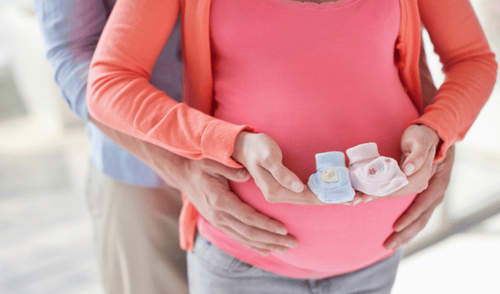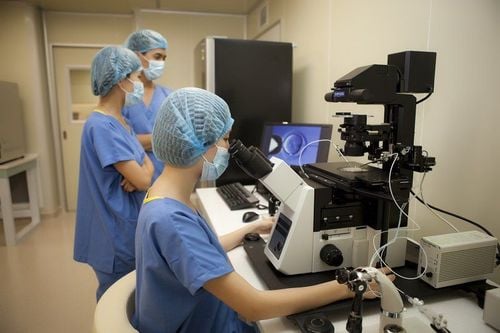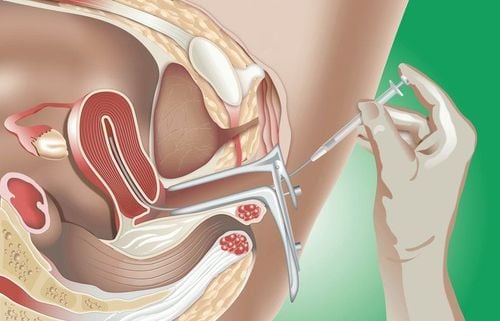The article was professionally consulted by Doctor Phan Diem Doan Ngoc, Department of Obstetrics and Gynecology, Vinmec Central Park International General Hospital.
1. Abnormal uterine bleeding
One of the typical symptoms of uterine fibroids is abnormal uterine bleeding, heavy menstruation, frequent menorrhagia, or metrorrhagia.
Tumors located near the uterine lining often tend to push and compress the endometrium. As a result, the thicker the endometrium at the beginning of the cycle, when it peels off, it will create a massive amount of menstrual blood. Some women even experience prolonged vaginal bleeding, following the menstrual cycle (menorrhagia) or outside the cycle (metastatic). The amount of blood loss causes the patient to become anemic, pale, and lose physical strength, and only then are uterine fibroids discovered when they go to the doctor.

2. Severe Menstrual Cramps
In contrast to uterine bleeding, if the fibroids are large and deep within the uterine wall, the woman will endure intense pain during each menstrual cycle. The reason is that when the uterus contracts to expel menstrual blood, the blood vessels supplying the fibroid constrict, causing a temporary lack of blood supply, leading to anaerobic metabolism that produces chemical byproducts causing pain.
If the fibroid is particularly large, when it undergoes necrosis due to nutrient deprivation, the lower abdominal pain should be approached as a surgical issue, sometimes requiring emergency surgery.
3. Change in bowel habits
This is a symptom of nearby organs being compressed by uterine fibroids. If the tumor is located near the bladder, it will reflexively stimulate you to urinate more often than usual. In some women, if the pelvic floor muscles lose control, they will easily experience continuous urine leakage or when there is only a small increase in abdominal pressure such as coughing, laughing, or sneezing.
Similarly, in addition to putting pressure on the bladder, uterine fibroids can also put pressure on the rectum. This will cause you to become constipated. However, the stimulation of the tumor often makes you feel the urge to push even though you can't go.
4. Pain During Sexual Intercourse
Fibroids located on or around the cervix can lead to pain during sex, as well as bleeding ranging from light to moderate afterward. Even if the fibroid is inside the uterus, the pressure exerted on the vaginal walls during intercourse can directly affect the fibroid, causing discomfort. Therefore, if you notice any signs of bleeding during or immediately after intercourse, or if this activity causes pain, you should seek medical attention early to assess the possibility of uterine fibroids.
5. Frequent abdominal pain or lower back pain
Pain anywhere in this area depends on the location and size of the fibroid. When the fibroid is large, it puts pressure on the lower back, pelvis or abdominal wall and can cause difficulty and hinder you in daily activities such as bending or exercising.
All of these symptoms are not specific to uterine fibroids, you are likely to be misdiagnosed with bone and joint diseases and have an X-ray, MRI instead of simply having an abdominal ultrasound.

6. Infertility
Although uterine fibroids are usually not cancerous and do not have a serious impact on your health, they can affect your fertility. If you have uterine fibroids, you may have more difficulty getting pregnant. And, if you do get pregnant, it is considered a high-risk pregnancy because uterine fibroids can cause premature labor, miscarriage, stillbirth, and postpartum hemorrhage.
Although not all women with fibroids will be infertile, they will have difficulty conceiving. As such, it is important to consult a doctor about your desire to have children. Thus they can assess whether fibroids are affecting your fertility and consider intervention.
7. Risk Factors for Uterine Fibroids
Research shows that up to 70 – 80% of women have uterine fibroids before the age of 50. Although knowing the symptoms helps diagnose and treat uterine fibroids and only 20% of fibroids are detected, the following factors will help assess your risk of developing uterine fibroids or the severity of your symptoms:
- Age: Uterine fibroids are more common in women of reproductive age, particularly in their 30s and 40s, and throughout menopause. After menopause, fibroids tend to shrink.
- Early Puberty: A girl who enters puberty and has her first menstrual cycle before the age of ten has a higher lifetime risk of developing uterine fibroids compared to other girls.
- Family History: A woman whose mother had uterine fibroids is nearly three times more likely to develop fibroids than women without a family history.
- Race: African American women are three times more likely to develop fibroids than women of other racial groups.
- Obesity: Weight also affects the risk of developing uterine fibroids. Research shows that overweight women have a three times higher risk of developing fibroids compared to women of normal weight.
If you have any of the signs described above, you may suspect you have uterine fibroids. The next step is to visit a gynecologist for an early examination and undergo a uterine ultrasound.
Regular gynecological examinations are very important to detect diseases early for timely intervention and treatment, avoiding harmful complications. The basic gynecological examination and screening package of Vinmec International General Hospital is implemented to help women screen and detect the earliest signs of gynecological diseases, thereby having appropriate treatment regimens and protecting women's reproductive functions in the most comprehensive way.
To arrange an appointment, please call HOTLINE or make your reservation directly HERE. You may also download the MyVinmec app to schedule appointments faster and manage your reservations more conveniently.













